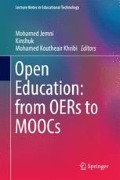Abstract
In today’s globalized, networked and fast-changing environment, knowledge became invaluable asset for everyone—students, workers and organizations. Lifelong learning became crucial to the future of our society. In order to foster more effective and collaborative learning and knowledge exchange it is necessary to utilize modern information technologies and services. If used in the right way, information technology can transform and energize educational process, stimulate learning in anyplace and anytime, promote creative thinking and make better use of existing individual and organizational resources. Although modern web technologies and open educational resources (OER) have great potential to bring new opportunities for learning and knowledge exchange, at the same time, developing successful OER systems is very challenging. Design of an innovative and open learning software environment needs a holistic approach, which comprises specific methodology, software architecture, and various services, applications and tools. The rationale of this chapter is to introduce the innovative open educational model and supporting software system that is capable to answer the major challenges of modern education. The proposed OER model and software platform enables creation of agile and adaptable educational ecosystem that can transform the learning experience, and connect individuals, educational institutions and companies.
Access this chapter
Tax calculation will be finalised at checkout
Purchases are for personal use only
References
Atkins, D. E., Brown, J. S, & Hammond, A. L. (2008). A review of the open educational resources (OER) movement: Achievements, challenges, and new opportunities. The William and Flora Hewlett Foundation.
BAEKTEL. (2013a). Baektel project rationale. http://baektel.eu/?menu=objectives
BAEKTEL. (2013b). Project content and methodology. http://baektel.eu/?menu=rationale
BAEKTEL. (2015). Dev 2.3—Conceptual design of the ICT solution for BAEKTEL OER framework. http://baektel.eu/?menu=deliverables
Beetham, H., & Sharpe, R. (Eds.). (2013). Rethinking pedagogy for a digital age: Designing for 21st century learning. New York: Taylor & Francis.
Bonk, J. C. (2009). The World is open how web technology is revolutionizing education. San Francisco: Jossey-Bass.
Brown, J. S., & Adler, R. P. (2008). Minds on fire. Open education, the long tail, and learning 2.0. Educause Review, 1–2, 17–32.
Carayannis, G. E., Popescu, D., Sipp, C., & Stewart M. (2006). Technological learning for enterpreunial development (TL4ED) in the knowledge economy (KE): Case studies and lessons learned. Technovation, 26, 419–443.
Cheung, S. K. S., Li, K. C., & Yuen, K. S. (2013). An overview of open education resources for higher education in knowledge sharing through technology. Communications in Computer and Information Science, 407, 26–34.
D’Antoni, S. (2009). Open educational resources: Reviewing initiatives and issues. Open Learning: The Journal of Open and Distance Learning, 24(1), 3–10.
de Langen, F. H. T., & Bitter-Rijkema, M. E. (2012). Positioning the OER Business Model for Open Education. European Journal of Open, Distance and E-Learning, 1.
Delloite. (2014). Global Human Capital Trends 2014: Engaging the 21st-century workforce. Delloite University Press.
Geser, G. (2007). Open e-Learning Content Observatory Services (OLCOS) Roadmap 2012. European Commission.
Ha, K., Niemann, K., Schwertel, U., Holtkamp, P., Pirkkalainen, H., & Boerner, D., et al. (2011). A novel approach towards skill-based search and services of Open Educational Resources. Proceedings of the 5th International Conference on Metadata and Semantics Research (MTSR ´11) (pp. 312–323).
Lai, H.-M., & Chen, C.-P. (2011). Factors influencing secondary school teachers’ adoption of teaching blogs. Computers & Education, 56(4), 948–960.
Lal, P. (2015). Organizational learning management systems: time to move learning to the cloud! Development and Learning in Organizations: An International Journal, 29(5), 13–15.
Liu, X., Jiang, Y. & Gao, L. (2015). Scientific Information Understanding via Open Educational Resources (OER). Proceedings of the 38th International ACM SIGIR Conference on Research and Development in Information Retrieval (pp. 645-654), August 09–13, 2015, Santiago, Chile.
Microsoft. (2014). Education Transformation Framework Overview. http://download.microsoft.com/download/8/e/4/8e4d5383-058a-431e-9090-1f241ac23246/1_ms_edu_transformationpapers/ms_edu_bonuscoreoverview.pdf
Microsoft. (2015). Creating innovative schools. http://pilnetwork.blob.core.windows.net/public/Creating%20Innovative%20Schools.pdf
OECD. (2007). Giving knowledge for free—the emergence of open educational resources. Centre For Educational Research and Innovation.
Plotkin, H. (2010). Free to learn—an open educational resources policy development guidebook for community college governance officials. San Francisco: Creative Commons.
Sarkar, S. (2012). The role of information and communication technology (ICT) in higher education for the 21st century. The Science Probe, 1(1), 30–41.
Senges, M., Brown, J. S., & Rheingold, H. (2008). Entrepreneurial learning in the networked age. Paradigmes, 1, 125–140.
Smith, M. S., & Casserly, C. M. (2006). The promise of open educational resources. Change: The Magazine of Higher Learning, 38(5), 8–17.
Sotiriou, S. A., Agogi, E., Athanasiades, N., Ramfos, A., Stracke, C. M., & Richter, T., et al. (2013). Open discovery space. http://www.opendiscoveryspace.eu/sites/ods/files/open_discovery_space.pdf
Stefanovic, N., Stefanovic, D., & Arsovic, B. (2013). Adaptivity in e-Learning LMS platform. Revista Metalurgia International, 18(3), 156–162.
Stefanovic, N., Radojevic, I., Ostojic, A., Comic, Lj, & Topuzovic, M. (2015). Composite web information system for management of water resources. Water Resource Management, 29(7), 2285–2300.
Wikipedia. (2012). Massive open online course. http://en.wikipedia.org/wiki/Massive_open_online_course
Yates, R. (2013). Educational technologies to support new directions in teaching practice. International Journal of Information and Education Technology, 3(6), 602–606.
Yuan, L., MacNeill, S., & Kraan, W. (2008). Open educational resources—opportunities and challenges for higher education, http://wiki.cetis.ac.uk/images/0/0b/OER_Briefing_Paper.pdf
Yuan, L., & Powell, S. (2013). MOOCs and Open Education: Implications for Higher Education. Centre for Educational Technology and Interoperability Standards.
Acknowledgments
Research presented in this paper was supported by Ministry of Science and Technological Development of Republic of Serbia, Grant III-44010, Title: Intelligent Systems for Software Product Development and Business Support based on Models and by the TEMPUS Project—BAEKTEL (Blending Academic and Entrepreneurial Knowledge in Technology Enhanced Learning)—No. 544482.
Author information
Authors and Affiliations
Corresponding author
Editor information
Editors and Affiliations
Rights and permissions
Copyright information
© 2017 Springer-Verlag Berlin Heidelberg
About this chapter
Cite this chapter
Stefanovic, N., Milosevic, D. (2017). Innovative OER Model for Technology-Enhanced Academic and Entrepreneurial Learning. In: Jemni, M., Kinshuk, Khribi, M. (eds) Open Education: from OERs to MOOCs. Lecture Notes in Educational Technology. Springer, Berlin, Heidelberg. https://doi.org/10.1007/978-3-662-52925-6_17
Download citation
DOI: https://doi.org/10.1007/978-3-662-52925-6_17
Published:
Publisher Name: Springer, Berlin, Heidelberg
Print ISBN: 978-3-662-52923-2
Online ISBN: 978-3-662-52925-6
eBook Packages: EducationEducation (R0)

